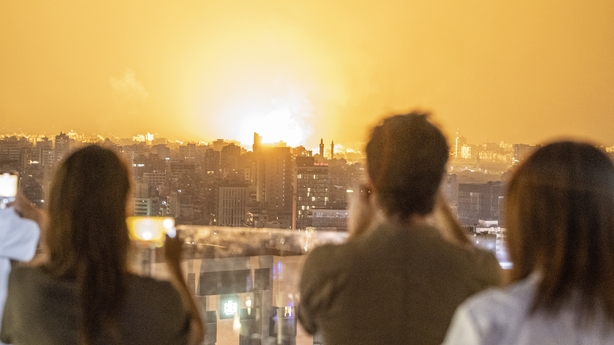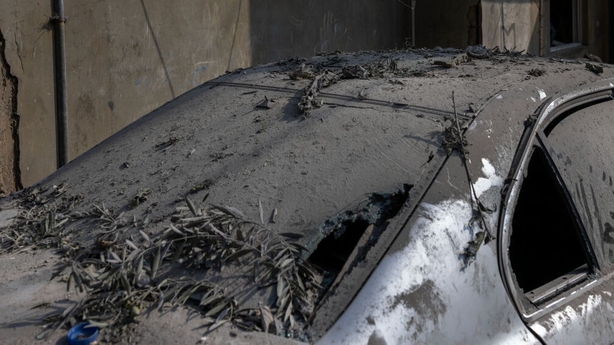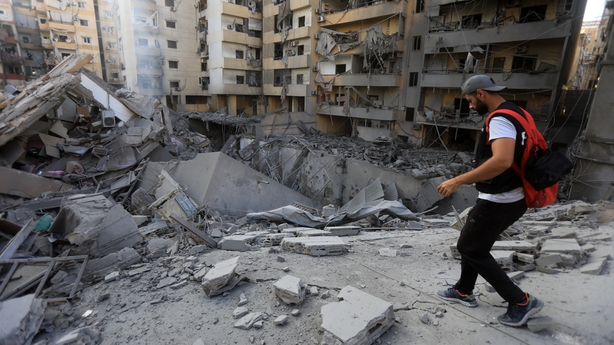Official Lebanese media has reported Israeli strikes on south Beirut, shortly after calls by Israel's army for residents to evacuate the Hezbollah stronghold - repeatedly bombarded for several days.
"Enemy warplanes launched two strikes on the southern suburbs, the first targeted the Saint Therese area, and the second targeted the Burj al-Barajneh area," Lebanon's National News Agency said.
An AFP correspondent said her windows shook after one of the strikes and another heard loud explosions.
AFP live video footage captured three strikes, one of them triggering a big explosion with flaming flares shooting out as thick black smoke billowed.
"Urgent warning to the residents of the southern suburb of Burj al-Barajneh and Hadath Beirut ... you are located near Hezbollah facilities and interests, and the IDF (Israeli military) will operate against them in the near future," said Israeli military spokesman Avichay Adraee on X, urging residents of the areas to leave.
Meanwhile, a Hezbollah official has claimed that Israel is not allowing a search for senior Hezbollah leader Hashem Safieddine to progress after it bombed Beirut's southern suburbs on Thursday.
Safieddine is seen as a likely successor to former leader Sayyed Hassan Nasrallah who was killed in an Israeli strike on Beirut's southern suburbs, known as Dahiye, on Sept 27.
His fate remains unclear.
The senior Hezbollah political official, Mahmolud Qmati, also said he had no information on reports that the leader of Iran's elite Quds Force Esmail Qaani has not been heard from since the strikes on Beirut late last week.
Israel should "let rescue teams do their work," he told Iraqi state television.
Qmati said that Hezbollah was now being jointly led until it could pick a new leader, which would take time.
"What's important is that joint command is in place," he said.
"The method of choosing a replacement for the secretary-general takes time and requires appropriate circumstances, and for that reason we suffice today with temporary joint command," he added.
Overnight attacks batter Beirut
Israeli air attacks battered Beirut's southern suburbs overnight and early today in the most intense bombardment of the Lebanese capital since Israel sharply escalated its campaign against Iran-backed group Hezbollah last month.
During the night, the blasts sent booms across Beirut and sparked flashes of red and white for nearly 30 minutes visible from several kilometres away.

It was the single biggest attack of Israel's assault on Beirut so far, witnesses and military analysts on local TV channels said.
Today, a grey haze hung over the city and rubble was strewn across streets in the southern suburbs, while smoke columns rose over the area.
"Last night was the most violence of all the previous nights. Buildings were shaking around us and at first I thought it was an earthquake.
"There were dozens of strikes - we couldn't count them all - and the sounds were deafening," said Hanan Abdullah, a resident of the Burj al-Barajneh area in Beirut's southern suburbs.
Videos posted on social media, which Reuters could not immediately verify, showed fresh damage to the highway that runs from Beirut airport through its southern suburbs into downtown.
We need your consent to load this rte-player contentWe use rte-player to manage extra content that can set cookies on your device and collect data about your activity. Please review their details and accept them to load the content.Manage Preferences
Israel said its air force had "conducted a series of targeted strikes on a number of weapons storage facilities and terrorist infrastructure sites belonging to the Hezbollah terrorist organization in the area of Beirut".
Lebanese authorities did not immediately say what the missiles had hit or what damage they caused.
This weekend's intense bombardment came just ahead of the anniversary of the 7 October attack by Palestinian militant group Hamas on southern Israel in which some 1,200 people were killed and more than 250 taken hostage, according to Israeli figures.
The target of Israel's airstrikes across Lebanon and its ground invasion in the south of the country is the Lebanese armed group Hezbollah, Iran's chief ally in the region.
More than 2,000 people have been killed in nearly a year of fighting, most of them in the past two weeks, according to the Lebanese health ministry. The ministry said today that 23 people had been killed on Saturday.

The United Nations' refugee chief said that there were "many instances" where Israeli airstrikes had violated international law by hitting civilian infrastructure and killing civilians in Lebanon.
Israel says it targets military capabilities and takes steps to mitigate the risk of harm to civilians, while Lebanese authorities say civilians have been targeted. Israel accuses both Hezbollah and Hamas of hiding among civilians, which they deny.
For days, Israel has bombed the Beirut suburb of Dahiyeh - considered a stronghold for Hezbollah but also home to thousands of ordinary Lebanese, Palestinian and Syrian refugees - killing its leader Sayyed Hassan Nasrallah on 27 September.
A Lebanese security source said yesterday that Hashem Safieddine, Nasrallah's potential successor, had been out of contact since Friday, after an Israeli airstrike on Thursday near the city's international airport that was reported to have targeted him.
Israel continues to bomb the area of the strike, preventing rescue workers from reaching it, Lebanese security sources said.
Hezbollah has not commented on Safieddine.
His loss would be another blow to the group and its patron Iran. Israeli strikes across the region in the past year, sharply accelerated in recent weeks, have devastated Hezbollah's leadership.
Hezbollah said it fired rockets at Israeli forces during a casualty evacuation, used artillery at another site in the south and launched assault drones on an Israeli military base.
Lebanon's education minister said the start of the new school year was being postponed until 4 November because of "security risks".
Iran has signalled it does not want a direct war with Israel but has launched responses on occasion to Israeli attacks. It fired a barrage of ballistic missiles at Israel on Tuesday that did little damage.
Israel has been weighing options for its response.
Iranian state media reported this evening that flights from all Iran's airports would be cancelled until 6 a.m. local time on Monday due to operational restrictions, without elaborating. It was not clear if the announcement was linked to the ongoing conflict in the region.
'Major moment of jeopardy' - Taoiseach
Taoiseach Simon Harris has said this is "a major moment of jeopardy" in the Middle East and added that it is "most important that there is a de-escalation".
He has thanked the Irish men and women who are deployed on the UN peacekeeping mission in Lebanon, who he said are "serving with absolute distinction".
"Our peacekeepers, I want to thank them publicly, are doing a great service, and I want to thank them for their bravery, their commitment and their determination to their task."

Mr Harris said there are 30 Irish troops at an outpost that "is in a location that is the subject currently of a lot of violence and a lot of fighting".
"Obviously, from an operational point of view, that's monitored very closely and very carefully as to what is the safest thing to do."
"But at the moment, the advice is that the safest and best thing to do is for the mission to continue."
However, the Taoiseach said he wanted to assure the people of Ireland and most particularly, the families of the peacekeeping troops, that "the safety of the troops is kept under constant review."
Policewoman shot dead in southern Israel attack
Meanwhile, Israeli police have said a female border officer was killed in a shooting attack on a bus station that first responders say injured ten others.
"Paramedics have pronounced a 25-year-old female deceased, and are evacuating ten casualties," emergency service provider Magen David Adom said in a statement.
Police identified the victim as Sergeant Shira Haya Suslik, a member of the border police, and said she "fell during an encounter with a terrorist in an attack that occurred today at the central bus station in Beersheba".
Police said the incident was being treated as a "suspected terrorist attack".
"A number of injured on the scene. The terrorist was neutralised at the scene and many police forces of the southern district are at the scene," said a police spokesman in a statement.
Hamas praised the "heroic" attack, saying it "came in defence of our people, our land, and our holy sites".
The incident comes just days after a Hamas-claimed shooting attack last week in which seven people were killed in Israel's commercial hub of Tel Aviv.
The Tel Aviv attack - one of the deadliest in the country since the 7 October Hamas attack - came as Iran fired about 200 missiles at Israel, sending hundreds of thousands of people into public shelters.
In Gaza, Israel's military said it encircled the Jabaliya area of northern Gaza after indications Hamas was rebuilding despite nearly a year of devastating air strikes and fighting.
At least 26 people were killed and 93 others wounded when Israeli airstrikes hit a mosque and a school sheltering displaced people in Gaza earlier today, the Hamas-run Gaza government media office said.
The Israeli military said it had conducted "precise strikes on Hamas terrorists".
'Ongoing threat'
Ahead of tomorrow’s anniversary, Israeli military spokesman Rear Admiral Daniel Hagari told a televised briefing: "We are prepared with increased forces in anticipation for this day", when there could be "attacks on the home front".
Last year's 7 October attack on Israel by Palestinian militants resulted in the deaths of around 1,200 people, mostly civilians, according to an AFP tally based on Israeli official figures that include hostages killed in captivity.
One year later, Israel's war in Gaza against Hamas continues despite the focus shifting to Lebanon and Hezbollah.
The military claimed it had "encircled" the Jabaliya area of northern Gaza after intelligence detected "efforts by Hamas to rebuild its operational capabilities".
Additional reporting Fergal O'Brien
As the one-year anniversary of the Hamas attack on October 7 2024 approaches, listen to 'Drivetime In-Depth, War in Gaza' - available on RTÉ.ie/radio or wherever you get your podcasts: Drivetime In-Depth: War in Gaza - RTÉ Podcasts

